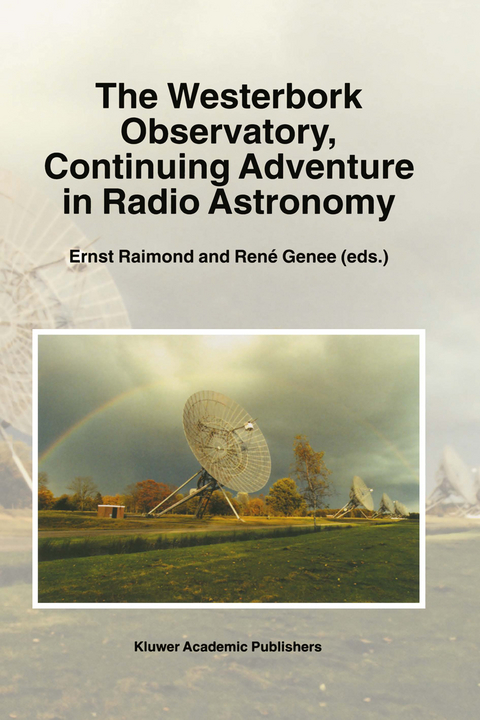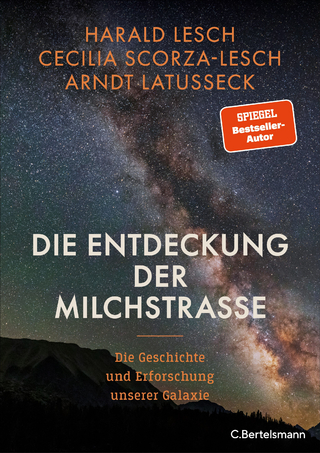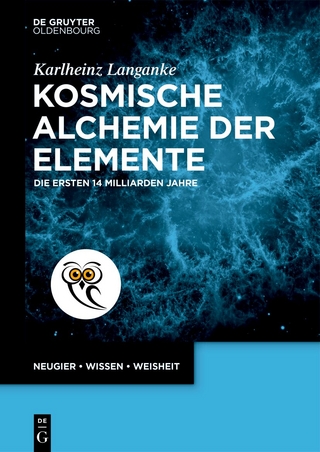
The Westerbork Observatory, Continuing Adventure in Radio Astronomy
Seiten
1996
Springer (Verlag)
978-0-7923-4150-5 (ISBN)
Springer (Verlag)
978-0-7923-4150-5 (ISBN)
A small country builds a world-class telescope in its backyard and lives happily ever after (or at least for a quarter century). Living happily in this context is a continuing record of discovery and as such also a continuing basis for se curing observing time on facilities in other countries and operating at other frequencies.
A small country builds a world-class telescope in its backyard and lives happily ever after (or at least for a quarter century). That in a nutshell is the story told in this collection of essays. The country of course is the Netherlands, and the telescope is the Westerbork Synthesis Radio Tele scope (WSRT), brainchild of Jan Oort. Living happily in this context is a continuing record of discovery and as such also a continuing basis for se curing observing time on facilities in other countries and operating at other frequencies. As our community celebrates the Silver Anniversary of the radio tele scope at Westerbork, it is fitting that we pause to take account of the scientific discoveries and insights it made possible. Initially the instrument represented the very significant step away from university-run, specialist facilities to a well-supported, common-user radio imager also having spec tral and polarization capabilities. It pioneered the mode of operation now common for satellite observatories, in which data is taken and calibrated by technicians and provided to researchers ready for analysis. It has been a major source of discovery in, among other areas, research on neutral hy drogen and studies of dark matter in galaxies.
A small country builds a world-class telescope in its backyard and lives happily ever after (or at least for a quarter century). That in a nutshell is the story told in this collection of essays. The country of course is the Netherlands, and the telescope is the Westerbork Synthesis Radio Tele scope (WSRT), brainchild of Jan Oort. Living happily in this context is a continuing record of discovery and as such also a continuing basis for se curing observing time on facilities in other countries and operating at other frequencies. As our community celebrates the Silver Anniversary of the radio tele scope at Westerbork, it is fitting that we pause to take account of the scientific discoveries and insights it made possible. Initially the instrument represented the very significant step away from university-run, specialist facilities to a well-supported, common-user radio imager also having spec tral and polarization capabilities. It pioneered the mode of operation now common for satellite observatories, in which data is taken and calibrated by technicians and provided to researchers ready for analysis. It has been a major source of discovery in, among other areas, research on neutral hy drogen and studies of dark matter in galaxies.
Oort’s Dream (1961).- Historical Notes: Four Decades of Dutch Radio Astronomy, Twenty-Five Years Westerbork Telescope.- The Synthesis Radio Telescope; Principles of Operation, Development of Data Processing.- A Quarter Century of Listening Pleasure — 25 Years’ Research with the WSRT.- The Westerbork Synthesis Radio Telescope, a Second Lease on Life.- The Westerbork Telescope and Very Long Baseline Interferometry.- Dark Matter and Neutral Hydrogen in Spiral Galaxies.- Powerful Radio Sources: Westerbork and Beyond.- The Square Kilometer Array Interferometer.- Prospects for Pulsar Research.- Gas in the Early Universe.- New Challenges for Cosmology.- Index of Names.
| Erscheint lt. Verlag | 30.9.1996 |
|---|---|
| Reihe/Serie | Astrophysics and Space Science Library ; 207 |
| Zusatzinfo | X, 266 p. |
| Verlagsort | Dordrecht |
| Sprache | englisch |
| Maße | 155 x 235 mm |
| Themenwelt | Naturwissenschaften ► Physik / Astronomie ► Astronomie / Astrophysik |
| Naturwissenschaften ► Physik / Astronomie ► Relativitätstheorie | |
| Technik ► Nachrichtentechnik | |
| ISBN-10 | 0-7923-4150-3 / 0792341503 |
| ISBN-13 | 978-0-7923-4150-5 / 9780792341505 |
| Zustand | Neuware |
| Informationen gemäß Produktsicherheitsverordnung (GPSR) | |
| Haben Sie eine Frage zum Produkt? |
Mehr entdecken
aus dem Bereich
aus dem Bereich
die Geschichte und Erforschung unserer Galaxie
Buch | Hardcover (2023)
C.Bertelsmann (Verlag)
30,00 €
Die ersten 14 Milliarden Jahre
Buch | Softcover (2024)
De Gruyter Oldenbourg (Verlag)
44,95 €


